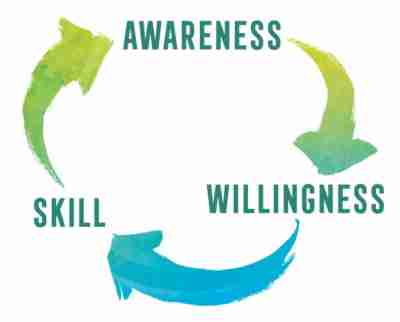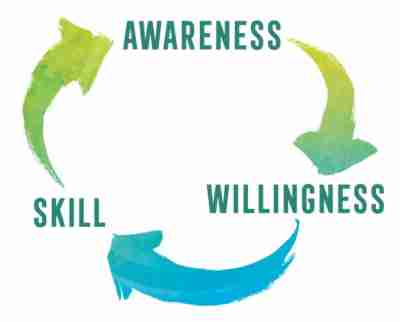The truth is that you can’t learn for someone else. You can set the conditions; you can spark their interest; and you can support, encourage, and train them, but the experience of learning happens within someone else’s inner landscape. We can, however, set ourselves up to have the best chance of positive influencing.
Developing people through conversations is the art of exploring the territory between where they are right now and the knowledge and capability you want them to build. This space between is not formulaic, and most people don’t have much self-awareness about their development patterns, so the territory is generally not well known.
To help navigate the frontier, first get your bearings. Ask yourself these three questions.
- Are they aware?
- Are they willing?
- Are they building skills through practice?
If you customize your development-oriented conversations based on where the other person is in their cycle of development, you will set them up for better results.
The Awareness-Willingness-Skill cycle is a simple and effective model for finding the development edge for team members while supporting them to grow through their experiences. Within the system of organizational life, we are all connected. Getting good at supporting and challenging one another’s growth is, in fact, supportive and challenging to our own.

Awareness
Think back to a time when you had a professional growth spurt—when you were really learning a lot about your field, profession, or role. How did you first become aware of the areas in which you needed to “grow up”? Did someone help you see the gap?
Becoming aware of the gaps between what we bring to the situation—our current capability—and what is required to succeed is the realization that kicks off deliberate growth.
Before we are aware of our gaps, our developmental edge is in a blind spot—we don’t know what we don’t know. We are not choosing what to do about it, because we have no idea there is something that needs doing. Trying to help someone build skills before they are aware of the need to do so tends to be a waste of time. They just don’t see the relevance and may fight to maintain the status quo.
If you need to help someone build awareness, you may want to:
- State the obvious in non-judgmental ways. “You seem to be feeling stuck about what to do about such and such,” or “I noticed fewer people speaking up after you expressed frustration in the last meeting.”
- Reflect on themes—using facts—from different occurrences. “Over the last month I noticed you seemed frustrated when x, y, and z happened. Let’s talk about it.”
- Provide candid feedback (with compassionate understanding). You can challenge someone to reach for the next level while also appreciating the effort they have already put in.
- Explore alternatives such as, “Thinking back on that situation, are there any other ways it could have been handled better?” Just having an awareness that there are other options in any situation can help us see that we made a choice and can, in fact, choose differently.
Once they become aware of a potential for change, team members can receive your support to help them make change—that is, if they are willing.
Willingness
There are myriad ways people consciously and unconsciously resist change by blaming others, making excuses, and refusing to see how they are creating the challenges they face. They also may not believe change is actually possible. It becomes particularly painful to watch when a valued team member is damaging themselves, their reputation, or the organization’s interests by their refusal to grow. As one of my colleagues likes to say, “They gotta wanna.”
To help team members build willingness, you can discuss the costs and benefits of their current behavior. Are they aware of the consequences of not growing in that area? Help them identify their own resistance to change, or what blocks their progress. Encourage small, specific steps or thought experiments to try new possibilities and develop other options. You’ll know they have moved out of the willingness stage and into skill-building when you see them practicing a new behavior.
Skill
Skill-building is where the action is. This is when developing staff are learning by doing, experimenting, and improving along the way. Here are six ways to have skill-building conversations while getting work done:
- Give them developmental assignments: Task the person with completing an assignment that is just a bit out of reach and then be their thinking partner as they tackle it. This can spur tremendous, deliberate growth. This works well with practical skills such as planning, facilitating, organizing, and driving an initiative forward.
- Walk the talk: Discuss your own growth and development. Demonstrate the process of changing yourself to illustrate how it’s done and inspire others to join you. Keep your commitments to your own development objectives, and share the results.
- Discuss a desired future: Regarding any project or assignment, ask them what the ideal outcome would be, or what success would look like for this situation. Help them build a robust picture of the future. Ask them what is important about their vision, and help them develop a clearer path to make it possible.
- Facilitate feedback discussions: Create a culture of being candid about challenges, asking for and giving support. Ask for input from others and share your thoughts.
- Connect to the big picture: Make a link between the day-to-day grind and the larger context for the work. Share information about what is most important, impactful, and meaningful. Ask what they think about it.
- Practice self-acceptance: Allow team members to grow gracefully. Acknowledge the progress they and you have made, as well as areas for further development. Create mental breaks and reward the hard work of growth.
Jessica G. Hartung is the founder and CEO of Integrated Work, which provides real-time leadership development to mission-driven organizations. Author of “The Conscious Professional: Transform Your Life at Work,” Hartung provides tools and mentorship for purpose-driven leaders to help them grow personally, professionally, and collectively from work experiences. Hartung is a trusted advisor to executive teams, helping to clarify, focus, and co-design strategic options and building leadership capacity to accelerate positive impact. For more resources to renew yourself and your skills, visit jessicahartung.com.

